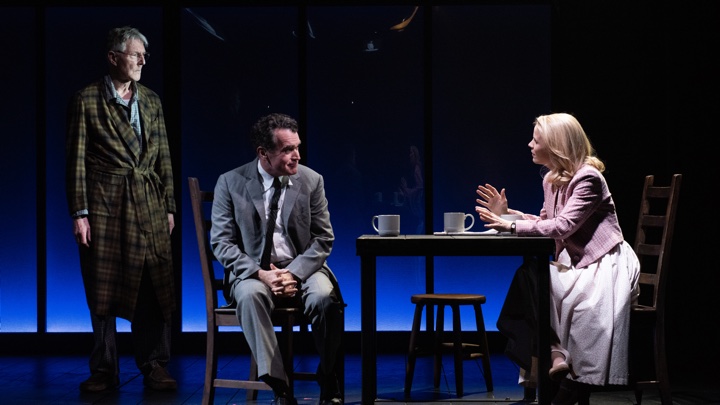

David Fox: Like you, Cameron, Light in the Piazza is in my pantheon. So it hurts to say this, but I found Days of Wine and Roses cruelly disappointing. Also frustrating, since it’s so clearly the work of an exceptionally gifted team of collaborators—Guettel and Lucas, of course, but also director Michael Grief, and a fine cast led by two of our best singing actors, Kelli O’Hara and Brian d’Arcy James—in what may well be the finest performances of their careers. I too welcome Guettel’s reemergence, but this deeply serious project ultimately doesn’t deliver. I should say I think we disagree about that, though.
CK: I do disagree. Although somewhat flawed, Days of Wine and Roses draws from the same musical language that made Piazza so instantly distinctive, and it features a specificity that I noticed in Guettel’s earlier breakthrough work, Floyd Collins. In the hands of a fine cast and an intimate, well-paced production for the Atlantic Theatre Company, Guettel delivers a poignant and memorable chamber musical that confirms his status as a big-league composer, however belated. As Norma Desmond might say: It’s not a comeback—it’s a return.
DF: For me, the score is less reminiscent of Piazza or Floyd Collins than it is of Myths & Hymns, a sprawling and long evolving cycle of songs that I find only intermittently satisfying. More on that later. For me, a different key problem with Days of Wine and Roses derives from the source material itself.
CK: Despite shifting the action from San Francisco to New York, Guettel and Lucas remain largely faithful to their progenitors—a Playhouse 90 teleplay by JP Miller that later became a celebrated feature film starring Jack Lemmon and Lee Remick. Against a repressive 1950s backdrop, Joe Clay and Kirsten Arnesen’s courtship blossoms amid their steadily growing dependency on alcohol. Even after they have a daughter and Joe loses his job, neither seems able to shake the habit. Miller flipped the gender expectations somewhat for the time by having Joe go straight while Kirsten backslides, and the original story ends resolutely on the downbeat: the audience senses that Kirsten will never truly overcome her demons, even as she recognizes them.
DF: I was only six years old when the movie came out in 1962, but not long after I remember my parents talking about how powerful it was. I can imagine its seismic impact at the time, including what may well have been revelations that challenged general expectations. The couple we see here are young, attractive, poised for a positive future. The grip of drinking feels both inexplicable yet somehow very real. And (spoiler alert) we are challenged also in our casual, sexist expectation that quitting drinking will be harder for the male partner than the female. But frankly, these insights are no longer surprising. Lucas’s book, mostly very faithful to the screenplay but inevitably reduced, loses the cinema verite continuity in favor of a more episodic structure. It puts even more pressure on the actors to show that they are people, not just alcoholics. Fortunately—and this is one area we completely agree about, I think—the central performances here are superb.
CK: Days of Wine and Roses reunites Guettel and Lucas with one of their Piazza collaborators, O’Hara. An ingénue then—albeit an interesting and complicated one—she has blossomed into a formidable leading lady, both on Broadway and, as readers of this website will recognize, the opera stage. As both Clara Johnson in Piazza and Kirsten Arnesen in Days of Wine and Roses, O’Hara meticulously chips away at a beautiful surface to reveal pain, longing, and sorrow underneath. Her slow-burning performance teases out the terror of alcohol addiction hiding within the façade of the good-time girl, and she shades her sun-dappled soprano with a dark resonance to communicate her character’s inner turmoil. The viewer feels acutely the pain of her inability—not her unwillingness—to quit drinking. As with her deeply moving performance of Laura Brown in The Hours (seen in Philadelphia and at the Met last year), she presents a golden girl with feet of clay.
DF: Seconded on all counts about O’Hara. She has the astonishing gift of often seeming to be refined and silently composed, while simultaneously finding nuances and layers that feel infinitely complex and even disquieting. This role calls on it perhaps more than any of her others, and her voice has never sounded better than it does here. James is every bit her equal as a singer and actor. The part of Joe Clay isn’t as richly textured as Kirsten, but his work is superb.
CK: The cast also has several strong supporting performances, including Byron Jennings as Kirsten’s forbidding father and David Jennings as Joe’s Alcoholics Anonymous sponsor. But with the occasional exception of Ella Dane Morgan as Kirsten and Joe’s daughter, Lila, the ancillary performers don’t sing. It’s a striking dramaturgical choice, one that further separates Kirsten and Joe from the action around them, plunging them deeper into their own world of addiction. It’s as if they speak a language only they understand, while those around them try (and fail) to get through to them.
DF: That’s an elegant reading of the structure, Cameron, though for me it’s over-generous. The ensemble feels pressed into service largely as functionaries, and then painted in bold and unsubtle strokes. I felt sorry for Morgan, since Lila seems largely to alternate between polarities of tears and sullen anger. I actually winced at one moment, her tearful, tugging question: “Daddy, when is Mommy coming home?” It was a cliche I hoped Craig Lucas would avoid, but didn’t. Sadly, it’s not the only one here. So… shall we talk about the score?
CK: Guettel’s score swells with lush melodies, and his orchestrations make interesting use of instrumental groupings, particularly in the woodwind. Certain numbers fuse jazz and pop sound of the era to unique ends. Scat singing becomes a lingua franca of drunken abandon, but even more interestingly, Kirsten adopts a bebop line in “Underdeath,” a tense song in which she tries to warn her daughter off the path she has chosen for herself. As the action progresses and the main characters chart their courses, the music reflects their paths—hopeful for Joe, increasingly despondent for Kirsten.
DF: Oh, I so wish I felt this way about the show! For me, the score is the real heartbreaker here. While Guettel’s compositional sophistication is never in doubt, and I hear some intriguing ideas deployed from time to time, the music follows the book’s episodic nature, and rarely feels like more than fragmentary recitative. The lushness you speak of I found only in a ballad for Kirsten that is one of the few fully formed songs, and also functions to give us a touching sense of what’s in her heart. But other musical metaphors make little sense to me: yes, scat evokes the 1950s setting, and it’s a clever way to suggest that Kirsten and Joe have lost verbal clarity… but musically, it requires absolute precision and dexterity: surely the opposite of what drinking brings out. I didn’t find much in Guettel’s lyrics either.
CK: It’s only in the musical’s final ten minutes that it grows treacly for me. Although Guettel and Lucas don’t abandon the source material’s dark conclusion, they tack on an unnecessary redemptive scene that offers a vision of what life for the family might look like if Kirsten dried out. Although it provides another opportunity for O’Hara to show off her limitless vocal capabilities, it blunts the sad heart of the story, and the sad truth of reality: not everyone recovers.
DF: While I agree that sentimentality is largely avoided, for me, this show falls into a different and equally toxic trap: it’s relentlessly earnest and worthy, to the point of feeling penitential. Somewhere near the end, it occurred to me that for all of its blue-chip status, Days of Wine and Roses reminded me of those Jesus musicals you find playing in Branson, Missouri. Frankly, it had the opposite effect on me. I sat there wishing I’d had another margarita at brunch.
CK: Serious question—if you have a cocktail before the show, does that count as audience participation?
Photos: Ahron R. Foster



























Comments